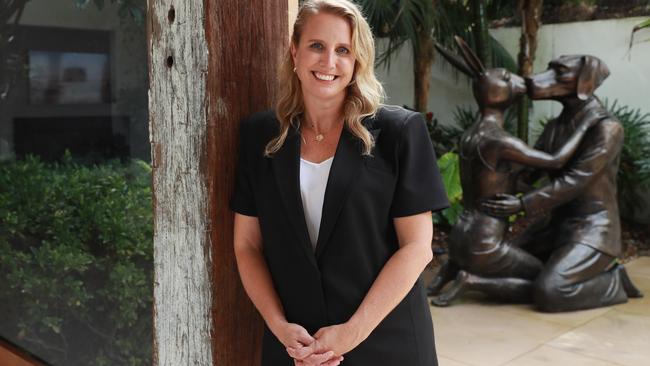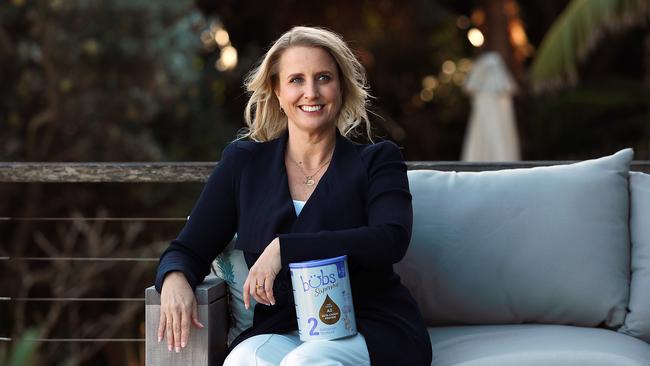Bubs to start producing infant formula in China for Chinese market
Chinese parents will be able to buy Bubs infant formula in retail stores for the first time after the company struck a controlling joint venture with a Chinese manufacturer.

Bubs will start manufacturing infant formula in China for the Chinese market – separating it from its Australian rivals – in what it describes as a “landmark deal” that will grant it greater access to a $40bn market.
After a year of negotiations, the company has struck a joint venture with Chinese manufacturer Heilongjiang Ubeite Dairy Group (HUG), which will initially produce Chinese-label products across the Bubs goat milk range.
Chinese-label products are allowed to be sold in bricks-and – mortar outlets, such as mother baby stores, which represent 80 per cent of the country’s $40bn infant formula market.
This compares with English-label products – the category Bubs has serviced to date – which represent 20 per cent of the market, and are sold mainly on cross-border e-commerce channels and by resellers known as daigous.
Under the partnership with HUG, the Chinese company will grant it one of its State Administration for Market Regulation (SAMR) approved manufacturing slots. HUG still needs to obtain approval for China’s new GB, or national standard, which comes into force early next year.
But Bubs founder and chief executive Kristy Carr said partnering with a Chinese company would accelerate the GB approval process.
“The process of going through a regulatory approval process in China under new GB standards is very quick; generally around three to six months,” Ms Carr said.
Bubs shares, which emerged from a trading halt on Wednesday, jumped more than 5 per cent to 52c, compared with a 0.5 per cent fall across the broader sharemarket.

The company has attempted such a strategy before, signing a memorandum of understanding with Chinese infant formula giant Beingmate to manufacture product in mainland China in August 2020. But it withdrew from that partnership later that year following changes in Beingmate’s leadership.
“It’s exactly the same strategy. We have been on this path for a very long time,” Ms Carr said.
“However, this deal structure is very different. It’s much more commercially attractive to us in terms of the quite minimal outlay in funds but also this is a joint venture where we have 75 per cent ownership and all the decision-making powers, whereas the Beingmate joint venture had 51 per cent ownership.”
The move is contrary to a decade-old trend of Chinese parents looking to buy foreign infant formula brands, particularly from Australia and New Zealand, following a contamination scandal in 2008. Chinese parents mistrusted their locally produced product after it was contaminated with melamine, killing six babies and putting another 54,000 in hospital, 12 years ago.
Rival A2 Milk is continuing to produce Chinese-label product under contract at Synlait in New Zealand, and two weeks ago Beijing renewed its SAMR registration until February 21 next year. Like Bubs and HUG, A2 is working closely with Chinese authorities to receive GB approval.
Ms Carr said while there was a section of the Chinese market which want imported infant formula, a greater portion was looking to locally manufactured product. HUB will initially manufacture Bubs’ goat milk-based infant formula, with first right of refusal on its cow’s milk product, containing the A2 beta casein protein.
“Even though the total market in China in volume terms is declining due to the reduction in birthrates, both the A2 protein cow milk and the goat infant formula sector and super premium sector are all still experiencing high value growth. So these are the areas that we want to play in,” Ms Carr said.
“It’s quite differentiated in terms of a distribution footprint because at the moment we can’t have our physical product in the mother and baby stores where over half infant formula is bought.”
It comes as Bubs is gaining a toehold in the US market after gaining temporary import approval from the Food and Drug Administration as part of the Biden Administration’s Fly Formula to help ease America’s chronic baby food shortage. The FDA has since offered Bubs a pathway to gain permanent approval.
“Infant formula is a very regulated space so to be able to navigate our way through the two largest markets in the world certainly opens up a lot of growth and opportunity for the future,” Ms Carr said.
Bubs hasn’t given any financial guidance on Chinese-label sales but expects to be in the market by the second half of this financial year.
Its English-label sales in China have rebounded after being hit by international border closures at the start of the pandemic, surging 179 per cent to $42m last year.
“We haven’t provided any guidance around the China label but there is no doubt it will be a material uplift on the existing product moving through the cross-border e-commerce channel,” Ms Carr said.




To join the conversation, please log in. Don't have an account? Register
Join the conversation, you are commenting as Logout